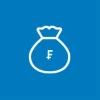The 50-30-20 rule can be helpful if you are not sure how much money you should save every month by dividing your income into three categories. This moneyland.ch guide explains the logic behind the rule.
What is the 50-30-20 rule?
The 50-30-20 rule is a basic rule of thumb for better personal finance management. The concept was first introduced to a larger audience by American law professor and politician Elizabeth Warren in her 2005 book, All Your Worth: The Ultimate Lifetime Money Plan. The method involves dividing your net income into three categories: Needs, wants, and savings. The numbers show which percentage of your post-tax income should be designated to each category.
- You should designate 50 percent of your income for your basic needs and fixed expenses. This category includes rent, insurance premiums, transportation, and groceries.
- 30 percent of your income should be set aside for things you want. This category includes non-essential spending like restaurant dining, vacations, and shopping.
- The remaining 20 percent should be saved, invested, or used to pay off debts. This money can, for example, be saved in an emergency fund, invested in ETFs, contributed to your pillar 3a, or used to repay loans. So this 20 percent plays a key role in building your personal wealth.
An overview of the 50-30-20 rule
Portion of
your income |
Purpose |
Examples |
| 50 percent |
Needs and fixed expenses |
Rent, electricity, health insurance,
other necessary insurances, groceries,
transportation, healthcare. |
| 30 percent |
Wants |
Shopping, restaurant and café dining,
vacations, leisure activities. |
| 20 percent |
Savings |
Savings, emergency fund, investments,
loan repayments. |
Example of the rule in practice: If your net income were 5000 francs, you would set aside 2500 francs for your basic needs, 1500 francs for things you want, and 1000 francs for savings.
In the ideal case, the 50-30-20 rule should ensure that you put enough money aside every month without having to neglect your personal needs or downgrade your quality of life.
How should I go about it?
You cannot use the 50-30-20 rule without first carefully examining your income (after taxes and social security contributions) and your expenses. In Switzerland, you have to deduct your monthly budget for taxes from your income in order to find the post-tax income used in this method.
Knowing your own income and expenses is always a basic requirement of sound financial planning. Tracking income and expenses can be done with an old-fashion household ledger book or with a digital medium. The budget guide and budgeting tool on moneyland.ch can help you plan your budget.
Once you have broken down all of your expenses, you need to divide them into the three categories. Determining the correct category is easier for certain expenses than it is for others.
How can I reduce my expenses?
If you determine that your budget does not leave enough room to save 20 percent of your income, you should check whether you have already used up all potential cost reductions. There are many ways to lower your spending. You can save both on needs (the 50-percent category) and on wants (the 30-percent category).
- Housing: For most household, the cost of housing is the biggest financial burden. That makes it the first expense that you should try to reduce. You can get some ideas on where to start in the guide to saving on housing in Switzerland.
- Insurance: Many Swiss are overinsured. Check whether you really need a travel insurance or pet insurance. The guide to necessary and unnecessary insurances can help you determine which insurance types you actually need in Switzerland. Comparing insurance premiums is also important: If you pay too much for your mandatory health insurance or your car insurance, you are giving away money that you could be saving.
- Subscriptions: Review your TV and mobile plans, as you may be able to save a lot of money by changing plans. You should also take a critical look at your other subscriptions. For example, if you rarely or never use your gym membership, it does not make sense to continue paying for it.
- Bank products: Are you paying too much for banking services? Paying high fees for bank accounts and stock brokerage accounts creates an unnecessary financial burden that can easily be resolved by migrating to cheaper banks.
- Consumer spending: Fixed expenses are not the only category you can save on. Your consumer spending habits are also key. For example, you can save a lot of money by preparing your own food instead of using restaurants. You can also potentially save money on grocery shopping.
- Transportation: The cost of getting around can be a substantial burden on your finances. You can find tips for reducing the costs of using a car in the saving guide for drivers in Switzerland. In many cases, you can reduce your transportation costs by using public transportation or bicycles instead.
The interactive comparisons on moneyland.ch can help give you a good idea of how much you could save by migrating to cheaper offers. You can also refer to the moneyland.ch saving guide for ideas on how to lower the cost of getting the things you need and want.
What should I do with my savings?
How you should go about investing your savings depends on your financial situation and your saving goals.
- Pay off your debts: If you owe money – if you have a personal loan to pay off, for example – then paying off your debts is the number one priority.
- Build an emergency reserve: Having an emergency reserve is essential to your financial security. This fund is only used for unforeseeable emergencies, and prevents you from getting into debt. Your emergency fund should contain enough money to cover your budget for three to six months – depending on your situation. Ideally, your emergency fund should be available in full at all times. A private account or savings account is suitable. You can find more information in the guide to emergency funds.
- Invest in ETFs: If you want to grow your wealth, you should not just save money, but ideally you should also invest your money and earn returns. That can normally be done using securities, although returns are not guaranteed. Exchange-traded funds (ETFs) make it possible to invest across many different assets, so investing in them is less risky than investing in individual stocks. You can buy shares in ETFs with a stock brokerage account from an affordable Swiss online broker. Alternatively, you can also invest using a low-cost online asset management service. Important: Only invest money that you will not need in the foreseeable future. Having an emergency fund gives you a financial buffer, and prevents you from having to use invested assets.
- Invest in products with fixed interest: If investing in the stock market is too risky for you, then you should at least try to earn as much interest as possible. Fixed deposit accounts and medium-term notes are two examples of investment products with fixed returns over a fixed term. The interest rate is often higher than that of savings accounts, but your money is locked in until the end of the fixed investment term. Because the interest rate is fixed for the whole term, there is also the risk that if market interest rates get better during that time, you could end up stuck with earning below-average interest. You can use the interactive moneyland.ch comparisons to find the going interest rates for savings accounts, medium-term notes, and other banking products.
- Contribute to your pillar 3a: The basic principle of the pillar 3a is that you get rewarded with tax deductions when you use it to save for your retirement. The main advantage of contributing to the pillar 3a is that you can deduct the money you save from your taxable income, up to an annual limit.
What are the weak points of the 50-30-20 rule?
The 50-30-20 rule is a simple concept that serves as a basic rule of thumb for personal finance planning and can help you grow your wealth. But this method also has a number of weak points.
- Categories can be hard to define: The difference between needs and wants is not always clear. For example, many groceries which most people consider to be standard components of an average shopping cart are not absolute necessities, in the strict sense of the term. Soft drinks, junk food, and snacks are some examples. It is also hard to define whether eating meals at a cafeteria falls under your basic needs, or if it qualifies as restaurant dining.
- The rule is rigid and inflexible: The concept of the 50-30-20 rule is somewhat hypothetical, and can be difficult to apply in the real world. The formula does not account for the fact that monthly expenses can vary from month to month – because of irregular expenses like small repairs or your children’s school field trips. However, these fluctuations can be minimized by carefully creating a budget that accounts for irregular expenses.
- Income and situations vary: The rule ignores differences between incomes and situations. A person with a high income and no children needs much less of their income for basic, ongoing expenses and can save a much larger portion of their income. People with low incomes often need more than 50 percent of their money for basic living expenses.
More on this topic:
A guide to emergency funds
Tips for saving money in Switzerland
Create a personal budget
Debt: Practical steps towards becoming debt-free
Swiss fund savings plan guide


 Deal of the Day
Deal of the Day 






